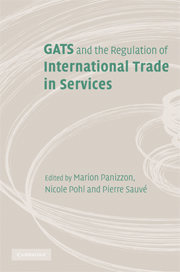Book contents
- Frontmatter
- Contents
- Contributors
- List of figures
- List of tables
- List of abbreviations
- Preface
- PART 1 Beyond regulatory control and multilateral flexibility: Gains from a cosmopolitan GATS
- PART 2 Unexplored economic, political and judicial dimensions of GATS
- PART 3 The limits of request–offer negotiations: Plurilateral and alternative approaches to services liberalisation
- 6 Services post-Hong Kong – initial experiences with plurilaterals
- 7 Negotiating approaches from a Member's perspective
- 8 Evaluating alternative approaches to GATS negotiations: Sectoral, formulae and others
- 9 Trade liberalisation under the GATS: An odyssey?
- PART 4 GATS case law: A first assessment
- PART 5 Market access, national treatment and domestic regulation
- PART 6 Unfinished business: Safeguard and subsidy disciplines for services
- PART 7 Challenges to the scope of GATS and cosmopolitan governance in services trade
- PART 8 Conclusion
- Index
- References
8 - Evaluating alternative approaches to GATS negotiations: Sectoral, formulae and others
from PART 3 - The limits of request–offer negotiations: Plurilateral and alternative approaches to services liberalisation
Published online by Cambridge University Press: 03 September 2009
- Frontmatter
- Contents
- Contributors
- List of figures
- List of tables
- List of abbreviations
- Preface
- PART 1 Beyond regulatory control and multilateral flexibility: Gains from a cosmopolitan GATS
- PART 2 Unexplored economic, political and judicial dimensions of GATS
- PART 3 The limits of request–offer negotiations: Plurilateral and alternative approaches to services liberalisation
- 6 Services post-Hong Kong – initial experiences with plurilaterals
- 7 Negotiating approaches from a Member's perspective
- 8 Evaluating alternative approaches to GATS negotiations: Sectoral, formulae and others
- 9 Trade liberalisation under the GATS: An odyssey?
- PART 4 GATS case law: A first assessment
- PART 5 Market access, national treatment and domestic regulation
- PART 6 Unfinished business: Safeguard and subsidy disciplines for services
- PART 7 Challenges to the scope of GATS and cosmopolitan governance in services trade
- PART 8 Conclusion
- Index
- References
Summary
In addition to the request–offer approach, which predominates in the current round of negotiations under the General Agreement on Trade in Services (GATS), the WTO Members have experimented with some alternative approaches over the years. These include negotiations along sectoral and modal lines, as well as those based on certain formulae or quantitative benchmarks. This article will discuss the lessons learnt from the negotiating experiences relating to these alternative approaches, and offer some suggestions on how the current and future GATS negotiations could benefit from the use of these approaches.
Alternative approaches in services negotiations: Experiences from the Uruguay Round
As noted by many commentators, the United States was instrumental in bringing services on to the agenda of the multilateral trading system. In early 1980, the US successfully persuaded the Trade Committee of the Organisation for Economic Co-operation and Development (OECD) to conduct a study on trade in services, which laid the groundwork for including this area of trade in multilateral trade negotiations. This did not lead to automatic inclusion of services in the trade agenda, however, as the contracting parties became engaged in a heated debate over the next few years on the desirability of regulating services trade under the framework of the GATT.
- Type
- Chapter
- Information
- GATS and the Regulation of International Trade in ServicesWorld Trade Forum, pp. 183 - 208Publisher: Cambridge University PressPrint publication year: 2008

